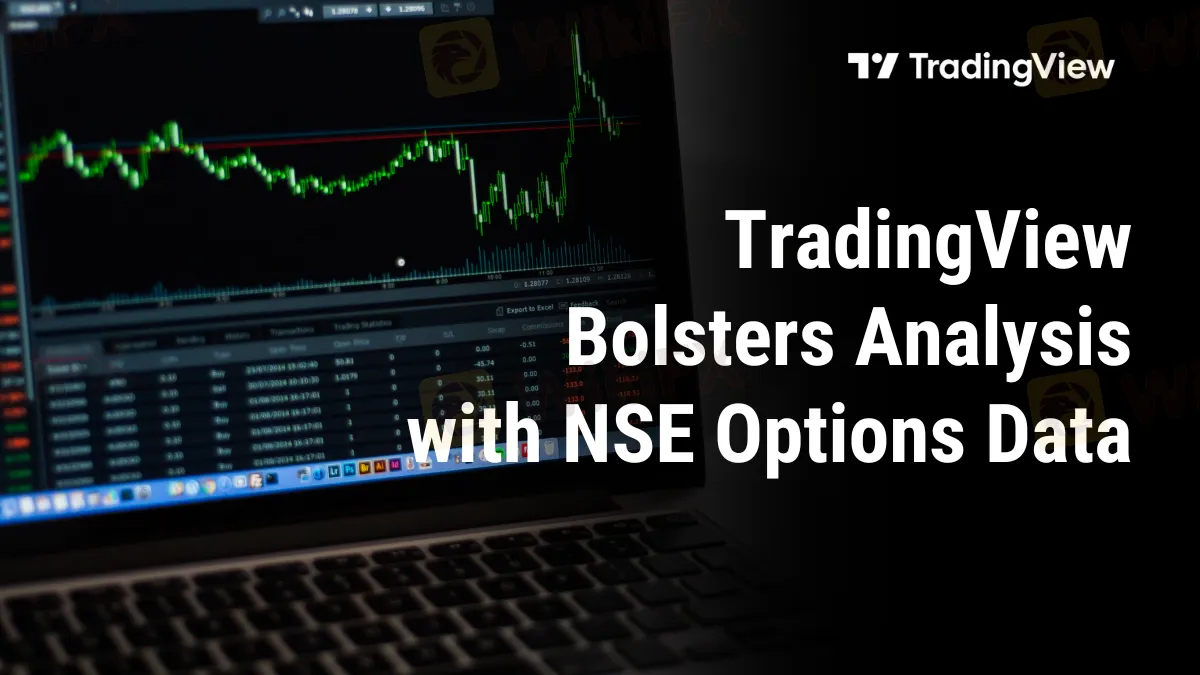简体中文
繁體中文
English
Pусский
日本語
ภาษาไทย
Tiếng Việt
Bahasa Indonesia
Español
हिन्दी
Filippiiniläinen
Français
Deutsch
Português
Türkçe
한국어
العربية
TradingView Bolsters Analysis with NSE Options Data
Abstract:TradingView enhances its offerings with the addition of options data from India's National Stock Exchange.

TradingView added NSE options data to its analytics program. This strategic development effort exposes more market data directly to enhance user experience and provide a wide variety of data tools.
Mumbai's NSE has led Indian financial markets in technology since 1992. Screen-based NSE trading began in 1994. The exchange has since improved its secure, adaptable, and reliable trading across several asset types. It is credited with pioneering Indian electronic commerce. Due to its pioneering pedigree, its data helps speculators and analytical tools make more informed market decisions.
Users of TradingView, a widely recognized platform among financial analysts and traders, had prior access to numerous NSE market categories, including equities, futures, indices, and exchange-traded funds (ETFs). Option data is good since it helps with strategic investment and risk management. With them, traders may hedge their portfolios against future market downturns or bet on the direction of the market with less risk.
Users must go to TradingView's symbol search, choose the Options tab, and enter the exchange prefix NSE to access the new options data. This rapid access to fresh data enhances the range of methods available to traders while also streamlining the analytical process. Option data integration allows TradingView users to analyze more data than before.
It is anticipated that sophisticated traders, who depend on a wide range of data to make wise judgments, would benefit most from the change. TradingView keeps up its dedication to providing premium, all-inclusive market research tools with the addition of options data. This step may also attract new users, particularly those who rely heavily on options trading.
Their cooperation with TradingView and commitment to technical innovation are crucial to the development of more comprehensive market analysis tools. This collaboration helps traders and analysts on an individual basis as well as strengthening the Indian financial trading industry as a whole. TradingView and NSE are enabling investors of all stripes to make better-educated, well-informed judgments in the market by giving them access to vital market data. This helps to democratize financial knowledge.


Disclaimer:
The views in this article only represent the author's personal views, and do not constitute investment advice on this platform. This platform does not guarantee the accuracy, completeness and timeliness of the information in the article, and will not be liable for any loss caused by the use of or reliance on the information in the article.
Read more

The Hidden Checklist: Five Unconventional Steps to Vet Your Broker
Forex broker scams continue to evolve, employing new tactics to appear credible and mislead unsuspecting traders. Identifying these fraudulent schemes requires vigilance and strategies beyond the usual advice. Here are five effective methods to help traders assess the legitimacy of a forex broker and avoid potential pitfalls.

Doo Financial Obtains Licenses in BVI and Cayman Islands
Doo Financial, a subsidiary of Singapore-based Doo Group, has expanded its regulatory footprint by securing new offshore licenses from the British Virgin Islands Financial Services Commission (BVI FSC) and the Cayman Islands Monetary Authority (CIMA).

CFI’s New Initiative Aims to Promote Transparency in Trading
A new programme has been launched by CFI to address the growing need for transparency and awareness in online trading. Named “Trading Transparency+: Empowering Awareness and Clarity in Trading,” the initiative seeks to combat misinformation and equip individuals with resources to evaluate whether trading aligns with their financial goals and circumstances.

Malaysian-Thai Fraud Syndicate Dismantled, Millions in Losses Reported
The Royal Malaysia Police (PDRM) has received 26 reports concerning the Nicshare and CommonApps investment schemes, both linked to a major fraudulent syndicate led by a Malaysian citizen. The syndicate’s activities came to light following the arrest of its leader by Thai authorities on 16 December.
WikiFX Broker
Latest News
ASIC Sues Binance Australia Derivatives for Misclassifying Retail Clients
WikiFX Review: Is FxPro Reliable?
Malaysian-Thai Fraud Syndicate Dismantled, Millions in Losses Reported
Trading frauds topped the list of scams in India- Report Reveals
AIMS Broker Review
The Hidden Checklist: Five Unconventional Steps to Vet Your Broker
Russia to Fully Ban Crypto Mining in 10 Regions Starting January 1, 2025
YAMARKETS' Jingle Bells Christmas Offer!
Why is there so much exposure against PrimeX Capital?
Doo Financial Expands Regulatory Reach with Offshore Licenses in BVI and Cayman Islands
Currency Calculator


